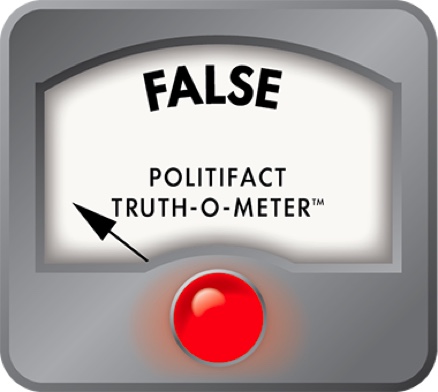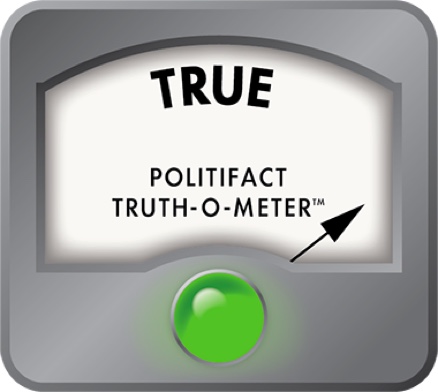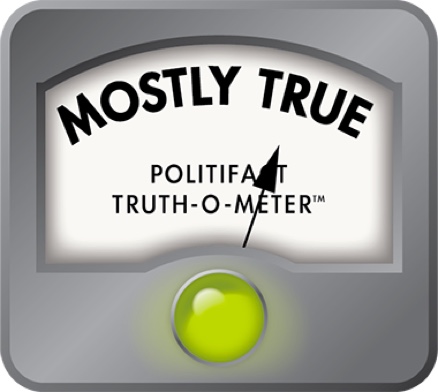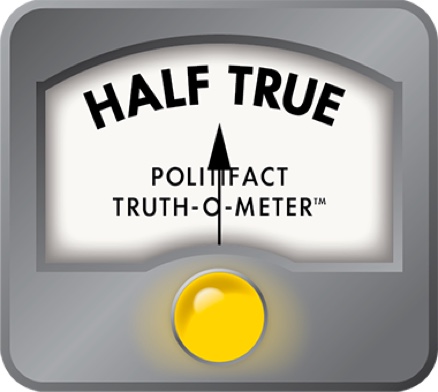Stand up for the facts!
Our only agenda is to publish the truth so you can be an informed participant in democracy.
We need your help.
I would like to contribute

Florida Gov. Ron DeSantis talks with reporters May 13, 2023, during a fundraising picnic for U.S. Rep. Randy Feenstra, R-Iowa, in Sioux Center, Iowa. (AP)
Florida Gov Ron DeSantis’ presidential announcement lurched before it launched — technical problems had the Twitter Spaces audio cutting in and out for 15 minutes, sometimes leaving long silences. When the audio finally steadied, DeSantis promised success.
"If you nominate me, you can set your clock to Jan. 20, 2025, at high noon," he said, "because on the west side of the U.S. Capitol, I will be taking the oath of office as the 47th president of the United States. No excuses."
DeSantis filed his paperwork to run for president in the afternoon of May 24 and then held the Twitter discussion with platform CEO Elon Musk, moderated by DeSantis supporter and tech entrepreneur David Sacks. As hundreds of thousands of people crowded into the virtual room, DeSantis continued his long-running promise to fight "woke ideology" and fielded questions from conservative activists about immigration, COVID-19 shutdowns, school book bans and The Walt Disney Co.
Here are seven claims that caught our attention.
DeSantis is referring to a 2022 law, HB 7, known as the "Stop Wrongs Against Our Kids and Employees Act" or the "Stop W.O.K.E. Act". The bill bans workplaces and schools from teaching that anyone "must feel guilt, anguish, or other forms of psychological distress" based on their race as a result of actions by others in the past.
The bill text doesn’t mention critical race theory by name.
Critical race theory is a broad set of ideas about systemic bias and privilege. The theory, which has existed in academia for decades, holds that racism is part of a broader pattern in America: It is woven into laws, and it shows up in who gets a job interview, the sorts of home loans people are offered, how they are treated by police, and other facets of daily life large and small. More than one dozen states have banned critical race theory in public schools.
A state House of Representatives staff bill analysis said that state Board of Education standards consider the the teaching of critical race theory as a distortion of historical events. Opponents of critical race theory suggest that the theory is pervasive in K-12 schools, but University of Missouri education professor LaGarrett King previously told us that the problem is blown out of proportion.
"The majority of teachers are not even familiar with what critical race theory is, nor do they teach it in their classrooms," King said.
This is misleading.
Although there have been some exaggerated or false online claims about Florida book bans, DeSantis’ statement downplays book removals that his own administration has acknowledged.
"Fact: School districts are required to report the number of books removed from schools based on legislation passed in 2022," a DeSantis administration press release said March 8. "Of the 23 districts that reported removing materials, the most removed were tied at 19 in Duval and St. Johns Counties — not even close to a whole classroom library. Of the 175 books removed across the state, 164 (94%) were removed from media centers, and 153 (87%) were identified as pornographic, violent, or inappropriate for their grade level."
On May 17, PEN America, a group that tracks book bans and advocates for free expression, joined book publisher Penguin Random House in suing Florida’s Escambia County school district and its school board after several books on LGBTQ+ topics were removed from school libraries.
This ignores that the military struggled with recruitment for years before President Joe Biden took office in 2021.
In 2014, we fact-checked former Florida Gov. Jeb Bush who correctly said that "too many" tattoos "on visible body parts" disqualified applicants from serving in the military. PolitiFact found in 2014 and 2011 that not meeting physical fitness requirements also kept applicants out of the military.
A 2020 Pentagon study found that 77% of young Americans would not qualify for military service without a waiver because they were considered to be overweight or had health or drug use problems.
U.S. Army Secretary Christine Wormuth told House members in April that the Army surveyed 2,400 people ages 16 to 28 about their views on obstacles to service.
"What we found was the number one fear was fear of death or injury," Wormuth said. "There was, sometimes, a fear of psychological harm, or a fear of leaving friends and family, and then after that it was, sort of, a fear of the Army, somehow putting your life on hold."
Wormuth said that concerns about "wokeness in the military or the COVID vaccine mandate, for example, those were relatively low on the list of barriers to service."
DeSantis’ statistic is rooted in official data, but the quality of that data comes with some major caveats.
The Florida Department of Law Enforcement shares crime data from local law enforcement agencies with the FBI for its Uniform Crime Reporting program. Data from 2021 showed Florida had a crime rate of about 1,952 crimes per 100,000 residents — nearly a 10% decrease from 2020.
That 2021 crime rate was the lowest recorded in Florida since 1971. But the quality of these numbers depends on the accuracy of the information supplied to the state, and local agencies have made errors before.
Police agencies have been transitioning to a new way of collecting the data. The Florida Department of Law Enforcement said that not all agencies responded with data amid the transition.
"The drastic differences in numbers of agencies reporting, and the different way that crime data is recorded, means that comparing 2021 data to earlier years is problematic," Lyndsay Boggess, a criminology professor at the University of South Florida, told us. "Even 2020 is challenging and potentially unreliable given the pandemic, quarantine, and shifts in peoples’ behaviors."
This is incorrect. The southern border is not open.
A combination of physical barriers such as fences, surveillance technology such as drones and about 20,000 U.S. Border Patrol agents help limit who and what comes into the United States.
Under U.S. immigration law, immigrants who try to cross the border illegally can be quickly turned back if they do not have a credible fear of returning to their home country.
Some people enter the country undetected — that’s happened under multiple administrations. But that’s not because of "open border" policies; that would negate the work done by Border Patrol agents and the billions of dollars that have been invested over decades to track movements at the southwest border.
This is accurate.
In the most recent annual Census Bureau data, for 2022, Florida gained 318,855 more people from other states than it lost to other states. The only other state with a six-digit total for net in-migration was Texas, with 230,961.
Metro areas in Florida also dominated the list of those that saw the biggest net in-migration flows.
Cape Coral-Fort Myers-Naples ranked first; North Port-Sarasota ranked second; Orlando-Lakeland-Deltona ranked seventh; and Jacksonville, which included portions of Florida and Georgia, ranked 15th.
This is accurate, partly because Florida is the nation’s third-most populous state.
According to a Pew Research Center analysis of 2020 Census data, Florida had 15,149 Black-owned businesses, defined as a Black owner having at least a 51% equity share. California ranked second, with 13,729, and New York placed third, with 12,636.
However, Florida isn’t first for Black-owned businesses as a percentage of all businesses in the state. The top three places are the District of Columbia, Georgia and Maryland, each with percentages exceeding 5%.
RELATED: Ron DeSantis is running for president in 2024. How accurate are his recent statements?
RELATED: Ron DeSantis’ once slim immigration agenda is now a focal point of his 2024 presidential bid
RELATED: As Ron DeSantis kicks off his presidential bid, how has Florida fared economically on his watch?
Our Sources
Tampa Bay Times, Florida crime is down, report says, but the full picture is muddled, Dec. 1, 2022
CQ transcript, House Armed Services Committee Holds Hearing on the Fiscal Year 2024 Department of the Army Budget Request, April 19, 2023
The Associated Press, Army sees safety, not ‘wokeness,’ as top recruiting obstacle, Feb. 12, 2023
Military.com, Even more young Americans are unfit to serve, a new study finds. Here's why. Sept. 28, 2022
CNN, Florida school moves Amanda Gorman's poem "The Hill We Climb" to middle school section after complaint, May 24, 2023
Email interview, Lyndsay Boggess, a criminology professor at the University of South Florida, May 22 and May 24, 2023
See additional sources in story

































